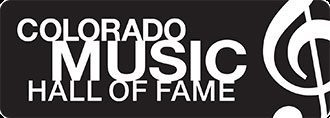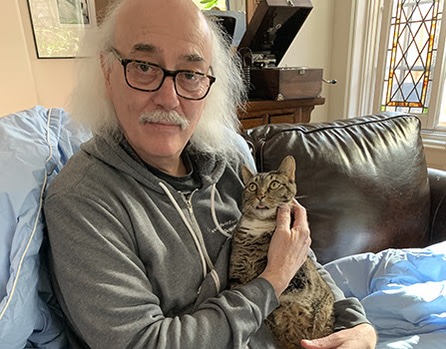By Connor Lukes, University of Denver Journalism Intern
Paul Epstein is a man with roots deeply embedded in Colorado’s music scene. Many undoubtedly know his name because he owned and operated the iconic Denver record store Twist & Shout for 33 years. What you may not know is that Epstein also co-founded Colorado Music Hall of Fame, and now is The Hall’s board co-chair and go-to music historian, with a command of modern music history that’s almost encyclopedic.
After over three decades of running Twist & Shout, overseeing everything from rainy days in the record business to the rise of international superstars, Epstein finally decided to hand over the reins of the store to the next generation and devote more time to his family and The Hall. In this interview, the nostalgic and optimistic Epstein reflects on his long and fulfilling career cultivating Denver’s music scene and looks forward to what the future has in store.
As both a founder of Colorado Music Hall of Fame and the current board co-chair, you’ve been a key player in its growth over the past ten years. What are you most proud of?
My career with The Hall has been an extension of what I also did in my career with Twist & Shout. It’s the coalescing of, maturity of, growth of and glorification of the local scene. This was a big thing when I first started the store. There was a very weak local music scene in Denver. The audience wasn’t supportive, and the bands were not supportive of each other. In the course of my career, I’ve seen that Denver’s changed a lot, and I hope we had some small part of fostering that at the store and at The Hall of Fame,…making the scene more cohesive. Denver is known as a really incredible music market with possibly the greatest venue in the world at Red Rocks. That’s something we all need to be really proud of. We also have this huge network of small theaters and scenes and genres of music, and these gigantic institutional festivals like Telluride and the Lyons Folk Fest and Central City Opera. There’s just an enormous history of all kinds of music in Colorado. I want that to be known, and I want to make it a bigger and bigger deal.
How did The Hall of Fame land at the Trading Post at Red Rocks, and are there plans to expand?
Well, there are a couple factors at play there. Our mission is, I’d say, sympatico to the destination, to Red Rocks. Our first founding member of The Hall, Chuck Morris, had a lot of sway at Red Rocks.
It really seems kind of miraculous that we’re there, and we’re incredibly proud of what’s there. That said, we also have hopes for a larger, permanent home closer to the city, too — although I’d love to keep the Trading Post as a part of our portfolio of locations going forward.
Especially since Karen Radman became the director of The Hall, we’ve been laser-focused on becoming a more and more professional and focused group. That caused us to be very thoughtful and slow in our process about where or what, exactly, our permanent home would look like. I would say we are circling. Our ultimate vision is beginning to become clearer and clearer to us. It is in the future, it will happen, and we would like it to be part of the central Denver scene.
With more free time as a retiree, what are you most excited about regarding your involvement with The Hall?
Well, I look forward to getting involved in the content on the website, both the creation and curation of it. Also, the project of figuring out where a home, in addition to the Trading Post, would be in Denver—what that would look like and how it would get funded. I look forward to being part of all those decisions. My interest really lies in the records, the ticket stubs, the posters, stage-worn outfits and guitars, the physical remnants….Being a music historian, those are really the things I’m the most qualified to help with.
At Twist & Shout, you brought in musicians for in-store performances. What is your favorite memory of a Colorado musician who played at your store?
We grew as the scene grew. In our early era, it was all about 16 Horsepower—David Eugene Edwards— and they did numerous in-store appearances and built a huge following. He went on to form a band called Wovenhand, which is now gigantic in Europe. We were friendly, and I really admired him. That was kind of an alternative Gothic country sound, and Denver was really off the radar still.
After that, there were bands we specifically had a hand in helping. In each case, the bands had an independently produced release that we would start selling. They had a lot of fun playing in the store multiple times, and I’d see the crowd get bigger. Eventually a label would call and ask me about them. The ones I’m thinking of specifically are The Fray, and then the Flobots. We were there when they put out their first independently released album. We sold over 1,000 of them before they got signed to Republic Records.
In the more recent era, absolutely from his earliest days, we’ve watched Nathaniel Rateliff. His group the Wheel played in our store, and then a couple of my employees started the label that put out his very first release. Then I had him play at an independent record-store convention in Denver. He was just starting to break, and we had him play for all the record-store owners. It was a watershed moment. [With the Night Sweats, he’s grown] nationally bigger, and he’s broken into a huge star.… Of the ones that paralleled the store and that I’m most proud of, if I had to pick one, I’d say Nathaniel Rateliff. But there’s been a lot of them throughout, and I only touched on a few.
What will you miss most about your interactions with Twist and the customers?
Well, it’s all great! Watching my employees go from being punk kids to being authors, actors, rock stars, lawyers, doctors: I’m so proud of the way they have grown up and stayed in touch.
My wife really described it well in one of our earliest newsletters. On a rainy Saturday when there’s a bunch of people in the store and the music is just right, nothing needs to be spoken. There’s just this record-store magic that happens. I’ve had so many people tell me, “I’ve heard this album a million times, but it has never sounded as good as just hearing it in the record store.” That is something I’ve noticed listening to records in that community atmosphere. It’s what I grew up with, and what many people, young people today, don’t have — but I think they may recognize in places like Twist & Shout. It is a magical thing to be in the presence of great art with other like-minded people.
After 33 years of operating Twist & Shout, what are your plans now that you’ve sold it?
Well, I got my first job when I was fourteen, and I pretty much never stopped working since then… I want to continue working in the music world, but not with deadlines and a work schedule the way I’ve known it for most of my life. I plan on still being fully involved in music, still being involved heavily in Colorado Music Hall of Fame – loving music and, of course, loving my family; loving Denver and being part of the many things I’m involved with in Denver.
So many people told me, “I don’t know how I worked all those years” once they retire. I always laughed and would be like, “Yeah man, give me an extra eight hours a day; I can’t even imagine what I would do with that.” Almost immediately, I was not bored. I was not at loose ends about what to do with my day. I do almost feel like, how did I work all those years? There’s so much of interest to me in my life still; I continue to be involved in music and my family. That’s how I see the rest of my life kind of going.
You know you’re doomed to be a boring old fart if you only look at history, so… I never stopped listening to or going to concerts of modern bands. Although that wanes as you get older, and that’s one of the reasons I decided to sell Twist & Shout to a person of another generation. He’s eleven years younger than me, and his musical tastes totally reflect that. I want the store to go on and do what it does in the future with modern music. I want The Hall to keep its eyes and ears entirely on the horizon, not on the rearview mirror.

